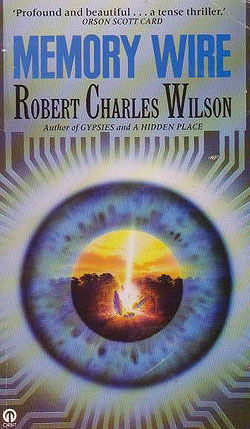What did you have for breakfast three Mondays ago? Was it raining that day? Can you remember?
What about a trauma you experienced or witnessed? Is it fuzzy edged, made indistinct by adrenaline and fear? Is it perhaps better that you don’t remember all the details?
Imagine everything you ever saw was recorded, stored in a memory chip in your brain and able to be reviewed later, or played back, edited and shown to others. Nothing would be forgotten, your highs and lows could be relived at any time.
How would this change you?
The main character of Robert Charles Wilson’s Memory Wire, Raymond Keller, has such a chip, and through him Wilson tells a fascinating story of memory, forgetting and trauma, in a story that is very much worth your time.
Keller is an off-the-books freelance news videographer in a dark and messed up future. Parched, water-rationed communities dot the USA. Vast floating barrios of hawsered-together boats sprawl off the coast of California, filled with the poor, South American migrants, and Indian refugees from a nuclear accident on the subcontinent.
Advanced tech is slowly changing the world, tech based on alien knowledge that has been slowly leaking from Brazil, where in an area of the Amazon strange extraterrestrial stones nicknamed ‘Oneiroliths’ have been discovered, each strange gem containing clues to the existence and lives of an alien race, and the keys to a science beyond our own.
But these stones are more than just tech repositories. Just holding one can cause people to re-experience their own lives as though they were living their memories over again, something that has led to them being traded on the black market, where they are used as a pseudo drug by people desperate remember loved ones and re-experience happy times.
Keller fought in a war over these stones, an invader on Brazilian soil, fighting guerrillas in a merciless asymmetric conflict. It was in Brazil where he was made into an ‘angel’; a soldier whose brain is packed with recording equipment that stores everything he sees and hears for later review by his superiors.
Being an Angel required more than just implants. To be able to force a soldier to film everything, even the most horrific, most incriminating things a person could see in war, required psychological changes too, the cultivation of an impassive, outsider-looking-in mindset isolated from the world and the people around you. Personal connections, love or friendship could destroy you – at any moment you might have to record the death of your friend or lover.
As you would expect, living through a war in a state like this has marked Keller deeply, and irony of ironies, he is a man who cannot forget desperately trying not to remember the things he has seen.
When an old comrade, himself once an Angel, introduces Keller to Teresa - an artist and Oneirolith addict - and involves them both in a plan to visit Brazil and steal a new, more potent type of stone that global authorities are trying to suppress, Keller’s studied detachment is threatened.
The wall he has built between himself, his memories and his emotions begins to fracture, and as he faces both his past and his unfeeling, lonely present, the reasons for the alien stones being left on Earth slowly begin to become clear.
Robert Charles Wilson is a hell of a writer, and Memory Wire is a rapid-fire, pacey novel that I gobbled up in a matter of hours. Wilson paints a vivid and convincing picture of a disrupted, unequal world, and the tortured internal lives of his protagonists really sucked me in, keeping me on edge as they get closer and closer to the mental and existential edge.
Wilson has been writing a long time, but even here, in one of his earlier works, his talent for concept and character is evident. His 1999 book Bios is a favorite of mine – it’s a stunning work of extraterrestrial eco-SF that I recommend to any fan of the genre. Memory Wire is now another I would recommend to fellow Sci-Fi fans – it’s a great read full of interesting and well-developed ideas and a fascinating character study in memory, trauma and psychological healing.
Four suppressed memories out of five.

